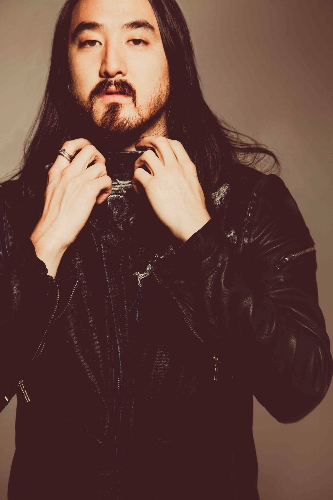DJ Steve Aoki takes a pass on academia to pursue passion for music

Steve Aoki is one of the most revered and successful DJs in the world — a status made possible by his mother, he says. She taught him how to be authentic and daring.
“My mom gave me the freedom to be able to explore creatively,” says Aoki, 33, who spins tonight at Surrender nightclub and Monday at XS.
“When I was 13, that’s when I was introduced to punk and hardcore music. That really was the start of all my crazy feelings for music.”
He didn’t need money or music lessons, since the punk and hardcore communities are do-it-yourself movements.
“I learned how to play all the instruments by the time I was 16 with no traditional teaching,” he says. “I just liked playing with my friends.”
At age 15, he started his first music ‘zine out of a Kinkos.
In high school, he began organizing and marketing concerts for touring bands.
At 19, he started his own record label Dim Mak (a Bruce Lee reference) with $400.
And yet, when he went to the University of California, Santa Barbara, his goal wasn’t a music career. He wanted to be a lifelong academic.
So he earned degrees in women’s studies and sociology. After that, he was accepted into two Ph.D. programs.
But he ditched his doctoral plans after he listened to demos of his college bands and realized: I’ve never believed in anything as much as music.
“It changed my career path to say, ‘(Screw) it, I’m gonna do this label, even though I’m absolutely not making any money, because eventually I will. I’m willing to risk everything.’ ”
Over the next decade, Aoki became a worldwide elite DJ.
When he’s in the music studio, he doesn’t much use his college education.
“If you gave me time, I could write a thesis between feminist theory and music theory,” he says and laughs. “But I’m not gonna do that.”
However, you better believe he uses his knowledge of sociology and women’s studies to move a crowd when he’s spinning from the DJ booth.
It’s like this, he says: The whole idea of a DJ set is to create a flowing narrative that fans can follow excitedly.
He builds up each DJ set, part by part: a heavy metal electro section; a transitional section; a vocal progressive house section.
A full 90 percent of his sets are his own songs, and the rest are other DJs’ tracks from his Dim Mak record label.
“But they’re all sequenced in a certain order so it all makes sense as a story,” he says.
“The idea is you want to make sure the crowd follows you all the way to the end. It’s very much a sociological perspective.”
He also uses his collegiate wisdom as an entrepreneur — running his music label, a clothing line, a music event company and other business interests.
“I’m an economist and sociologist at heart. I’m constantly looking at how things affect people,” he says.
“It’s all about people, and how people react to marketing, and what works for them — why they buy certain things and why they don’t.”
Success is also about authenticity, “the most important trait you can have,” he says.
“If people don’t believe you, or if people don’t think you’re genuine, they’ll turn away from you.”
Besides, he asks, what’s the point of doing anything if you’re not being honest?
“When I finish a track, I believe it, and I want everyone in the world to feel that same way.”
You could say Aoki benefited genetically: His dad started the Benihana restaurant chain. But more than that, he just worked very hard at what he loved.
There have been pitfalls. Aoki’s big brain didn’t make him immune to the party atmosphere of DJing.
“I was getting drunk all the time. I could barely make my flights,” he says. “I was pretty much drunk 80 percent of the year.”
He didn’t even enjoy his boozing.
“I always drank to get drunk,” he says. “I hate vodka, so I would just swill it and skull it until I was drunk and couldn’t taste it anymore.
“Then I’d be like, ‘Holy (crap), I drank half the bottle in an hour while I was DJing.’ I’d be blackout drunk in the corner of someone’s room not knowing what was going on in my life.”
For the past couple of years, he’s been back to his “straight-ish days to keep my head clear.” He switched to green tea. Everything is working out better.
“All I care about now is stamina. I just want to stay in the game, stay busy, keep working, keep putting out music that people care about, keep putting on shows that inspire people and inspire myself, and not get too (messed up).
“I’m the turtle in the race. I’d rather just keep going and take everything slowly as it comes.”
Doug Elfman’s column appears Tuesdays, Thursdays and Fridays. Email him at delfman@reviewjournal.com. He blogs at reviewjournal.com/elfman.












